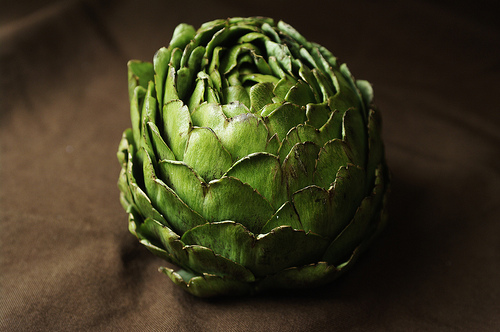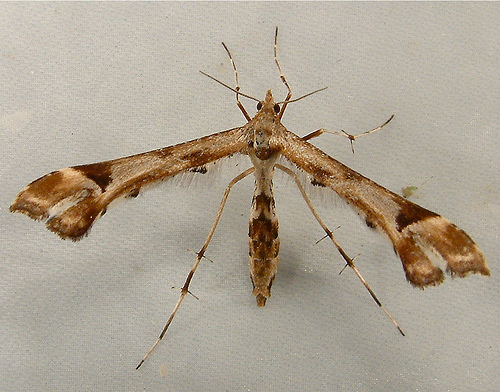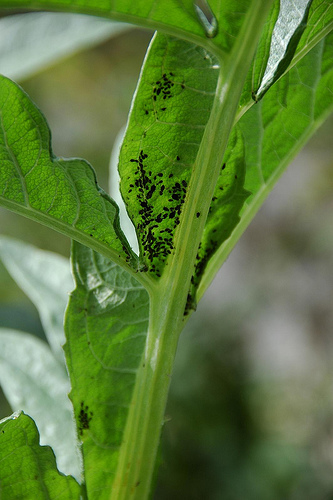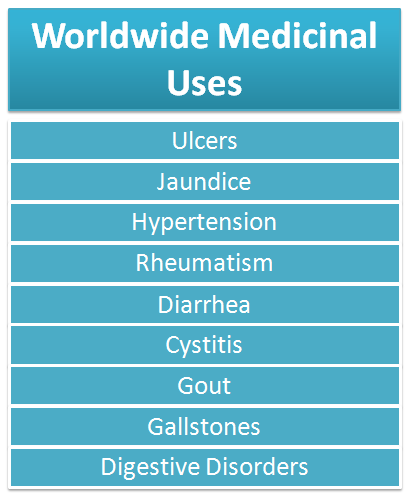Interactions and Medicinal Uses
The Globe Artichoke is a very useful organism that can help us humans in more ways than one!
Many organisms benefit from the Globe Artichoke's presence. However, in many cases this attention is not only wanted, but also detrimental to the ability of the artichoke to reproduce and survive. The most devastating of all organisms is the Artichoke Plume Moth (Platyptilia carduidactyla). This insect simply lays its eggs on the underside of the leaves or on the stem below the buds. Given time, the larvae leave the eggs and burrow into the stem, bud, and leaves of the artichoke. There they cause damage the plant and can stunt its growth. The moth continues to reproduce throughout the year. It has been found that this pest is not a problem for artichokes grown in desert environments.
The most common pests to artichokes are snails and slugs who snack on young
leaves. Snails sometimes attack the budding flower, destroying it. Aphids,
two spotted mites, nematodes, black flies are also common. Spiders have been
seen spinning webs in the bottom bracts of the plant. These however, are not
harmful to the artichoke. Caterpillars will feed on artichoke buds and
foliage which will destroy the growth point of developing seedlings. The
adult proba nymph is another possible threat. These organisms inject a toxin
into the stem of the plant while feeding. This process will stunt the growth
of the artichoke and cause the formation of unsightly scars.
Aphids pose a significant threat to the artichoke as they bring more issues with them. The aphid can cause a negative affect on growth, similar to the moth, but also may cause a sooty mold on the buds. This results in a great loss in yield. The extremely infectious disease known as artichoke latent virus is also transmitted by an aphid, more specifically, Aphis fabae. Transmission occurs from artichoke seedlings to the vector at an extremely high efficiency. This is exemplified by the 75% re-infection rate over 2 years.
The artichoke is at risk of contracting a variety of diseases that have a negative affect on its growth and reproduction. In a study done in Europe, a total of 23 viruses were found to infect the Globe Artichoke. Some of these include Artichoke vein banding virus, artichoke mottled crinkle virus, and artichoke yellow ringspot virus, which are all soil-borne diseases with unknown transmission.
Humans have also been feeding on the C. scolymus for centuries! Not only have we grown accustomed to consuming this delicious organism because of its great nutritional benefit, but it has been found to have an enormous array of medicinal properties. In the past, the Globe Artichoke has been used to treat snakebites, anemia, arthritis, and renal insufficiency. In Brazil, herbal remedies made with leaf preparations have been used to treat high cholesterol and hypertension. In our current day in age, the most common preparation is the extract derived from the leaves. A common dosage would be 2 - 3 mL with each meal. In a recent study, 553 human patients were given this extract in attempt to reduce the symptoms of dyspepsia caused by dyskinesia of the bile duct. This refers to indigestion due to improper contraction or increased pressure of the bile ducts. According to the study, 82.4% experienced a decrease in nausea, 68.2% saw a decrease in flatulence, and 76.2% reported a lessoning of abdominal pain. The results were recorded after 2 to 6 weeks of treatment. In another study, artichoke leaf extract was given to individuals with Hepatitis C. After 12 weeks, all patients noticed less fatigue and decrease pain associated with joint movement.
New research is constantly being conducted in hopes of validating more medicinal claims. Unless proper evidence is provided with appropriate sources, do not rely on such information. Always consult your doctor if you are planning on consuming any sort of concentrated artichoke product especially if you have other medical conditions. The information I am providing is purely informational and in no way am I proposing that you try any of these treatments without proper guidance.
Check out more TANTALIZING TID-BITS about the Globe Artichoke!
Back to HOME
Questions? Comments? Don't hesitate to contact me at
fenske.rach@uwlax.edu!
Site Designed by Rachel Fenske - Last Updated 4.15.11
University of Wisconsin - La Crosse



